|
 |
|
Drew Thompson |
The year 2009 began with celebrations in Beijing marking the 30th anniversary of the establishment of China-
U.S. diplomatic relations. President Barack Obama's inauguration also struck a new tone for the vitally important and complicated relationship between the two countries, which had benefited from its careful stewardship during the previous administration. But President Obama was determined to employ a "new realism" in his approach to China by breaking the cycle of previous administrations that came into office critical and dismissive of China, only to try to repair the relationship later in the term.
 |
|
FIGHTING CUTTHROATS: Scott Sanders (front right), Commander of the U.S. Combined Task Force 151, visits China's Zhoushan warship in the Gulf of Aden on November 1 along with Wang Zhiguo (front left), Commander of the Chinese convoy fleet (GUO GANG) | The government-to-government relationship has become increasingly institutionalized and regular with the outgoing Bush administration organizing the last Strategic Economic Dialogue in December, creating momentum for the forum's continuation, with a new format labeled the Strategic and Economic Dialogue (S&ED). Regrettably, the China-U.S. civilian relationship far outstrips the military one in terms of consistency and substance. The Obama administration came into office with bilateral military relations on hold following China's cancellation of military exchanges in response to announced U.S. arms sales to Taiwan. China released its defense white paper on Obama's inauguration day, assuring that it would receive little attention by U.S. media and senior officials not yet settled in their new offices. This low-key approach on China's part, coupled with the Obama administration's concerted strategy to engage China constructively from the outset was tested soon after the national security team was in place.
In March, the Pentagon lodged a formal protest with China and released video of Chinese vessels harassing a U.S. Navy surveillance ship operating 75 miles off the coast of south China's Hainan Province. This incident was part of an escalating series of encounters at sea between Chinese and U.S. vessels, which could have potentially resulted in a collision and pitted the two countries against one another in a standoff. But within days of the incident, Secretary of State Hillary Clinton and Foreign Minister Yang Jiechi met in Washington, with Secretary Clinton saying both sides "must work hard in the future to avoid such incidents." Unlike the April 2001 collision between a Chinese fighter plane and the U.S. Navy surveillance plane that crash-landed on Hainan in the first months of the Bush administration, in 2009 China and the United States controlled rhetorical rejoinders and quickly engaged in discussion, preventing the situation from escalating or undermining attempts to strengthen overall bilateral relations.
Those efforts to strengthen the bilateral relationship are conspicuous. President Obama's visit to Asia in his first year in office—the first ever for a U.S. president—is an important indication of the relative importance that China, South Korea, Japan and Southeast Asia occupy in Washington's strategy. Military-to-military rapport is tentatively improving as well, culminating in October with a visit of General Xu Caihou, Vice Chairman of the Central Military Commission, to Washington, D.C. Despite progress, mistrust runs deep on both sides and there is considerable room for improvement, prompting Secretary of Defense Robert Gates to ask General Xu to break the cycle of "on-again-off-again" military relations and commit to sustained contact.
 |
|
IN THE RIGHT DIRECTION: Chinese President Hu Jintao holds talks with U.S. President Barack Obama in Beijing on November 17 during Obama's first state visit to China (HUANG JINGWEN) |
Trade continues to be the most important pillar for the China-U.S. relationship, though tensions were heightened by the global financial crisis and high-profile trade cases. China's worries about the security of their investments in U.S. Treasury holdings and American concerns about a ballooning trade deficit and job losses will continue to test the relationship. However, U.S. officials such as Treasury Secretary Timothy Geithner, who studied at Peking University, and Commerce Secretary Gary Locke, the first Chinese-American governor and commerce secretary; both have a solid understanding of China and will undoubtedly be able to work through difficult challenges with their Chinese counterparts. Recent moves by the White House to simplify export approvals for restricted hi-tech products, as well as continued support for engagement through dialogues such as the S&ED and JCCT (Joint Commission on Commerce and Trade), underscore that despite disputes that might result in trade cases being filed at the World Trade Organization, the U.S. side is making a serious effort to ensure the bilateral trade relationship remains sound and develops steadily during the Obama administration.
|
